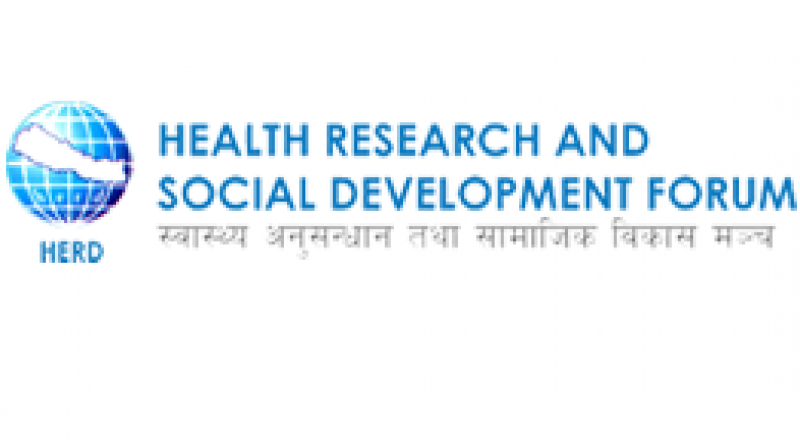HERD Qualitative Research Unit recently completed an important 10-months’ qualitative study on fertility awareness. The project team members share their experiences implementing this project:
The study titled, 'Formative Research on Community Mobilization through Existing Networks' explored knowledge, access and use of fertility and Family Planning (FP) services among married men and women using qualitative methods and looks into how different factors affect the use of FP. This project was implemented by HERD International with the support from Institute of Reproductive Health, Georgetown University and Save the Children.
This study was conducted in five districts of Nepal namely Bajura, Nuwakot, Pyuthan, Rupandehi and Siraha. The study participants were married women aged 15-21 years and men who were married to young women aged 15-21 years belonging to various caste/ethnic groups: Dalits, disadvantaged Janajatis, Muslims and Chhetris. Likewise, FP service providers from government health facilities of respective districts were also interviewed.
The findings from this study shall inform the development of strategies to further improve fertility awareness through locally tailored fertility awareness interventions.
Team Members' Tale
Abriti Arjyal, Senior Qualitative Research Officer
FACT project was a fruitful experience for me personally. I was involved in the project throughout the project duration. It was quite a challenge to collect, handle, manage and analyze a large amount of data as well as coordinate with various stakeholders during the project period to ensure that all activities are in place. We had strict selection criteria that created difficulty in finding the participants. This was a good learning for us to be conscious while defining the target groups, especially when the topic is sensitive as in this case family planning. Due to small age group, our participants did not speak up more despite our researchers trying hard to build rapport with them.
Through this project, we implemented a new research method, Participatory Group Discussion (PGD), where participants joined more actively by drawing and writing on their own. I had a chance to observe PGD during my field supervision and I felt that the participants were enjoying it and were more involved than FGDs.
We had to prepare district specific report, which was a good idea and effective too in terms of coming up with district specific findings. However, it was quite a challenge as we were coding analyzing and writing the report continuously for more than 4 months restlessly. We all are learners and we are learning and I believe this study was an opportunity for great learning. I would like to thank all who have supported and helped us complete the study.

Machhindra Basnet, Qualitative Research Officer
This was my first project at HERD. Earlier, I had worked in a small team. Here, the team was quite big and conducting research with a big team was a good experience. I even went to the field – monitoring the data collection. Since we had a large sample size and collected huge amount of data, at times we felt that the issues are redundant. That itself was a finding for us.
After receiving the data, we prepared district reports immediately. At HERD, we have a good practice of peer review and proof reading. We had a dedicated team who used to conduct the review in a short time. We received many relevant comments that helped us in making our reports look better.
Experiences of Field Researchers
Excerpts from a couple of field diaries written by field researchers involved in the project:
Rajita Dheke, Pyuthan
We were searching for eligible participants. The houses were scattered and as it was planting season so we couldn’t find most of the people at their homes. To get the better understanding about the scenario, I asked the Female Community Health Volunteer (FCHV) about the use of family planning in the area. She informed if the husbands are migrated, they don’t find any women using family planning method. It was very interesting to hear that one of the reasons was that even if the wife is using the FP method, the husbands called them and asked not to use it. Another was that the husbands were so insecure working outside that they forced their wife to have more babies so that they won’t elope with some other guy. They also believed that other men didn’t like women who had many children. If they only had one baby the husband thinks that their wife might go away with someone else. They forced their wives to have more babies and didn’t permit them to use FP method on their behalf as they thought she might get involved with some other men.
Mahima Sharma Lamsal, Rupandehi
While we were looking for the participants for the FGD we found out that the newly married girls were not allowed to go out of the premises of the house. When we reached Dumdumwa, we visited two newly married girls whose husbands had migrated. It was very shocking to hear that they were not allowed to do anything without the in-laws permission. One of them shared that they cannot move even an inch without the permission of the in-laws. We had to talk to the mother-in-law to take permission to talk to them. After she gave permission, the daughter-in-law talked to us.



Comments(0)
No comments found.